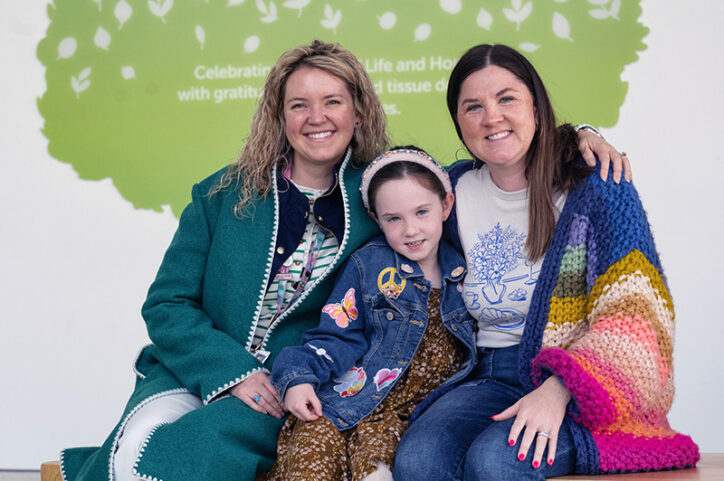No limitations: How Flora found answers for MOG antibody disease

Flora Ringler’s fifth birthday didn’t turn out as she had hoped. She and her family were vacationing in New Hampshire last year when she started feeling tired. But she wasn’t just worn out from celebrating: She also developed a bad headache and started throwing up. Concerned, her mom, Maureen, contacted a pediatrician, who thought she might have a virus.
A week passed and Flora’s symptoms hadn’t cleared up. Blood tests came back positive for Lyme disease and she started taking antibiotics. But when Flora continued to feel sick, Maureen brought her to her primary care doctor, who immediately sent her to the emergency room.
“I just knew something wasn’t right,” says Maureen.

A rare diagnosis
The doctors in Flora’s local emergency room suspected something more than Lyme disease was responsible for her symptoms and reached out to Boston Children’s Hospital. After being transferred to Boston Children’s, Flora underwent even more testing, had a spinal tap to relieve pressure on her brain, and was prescribed more medications.
“They told us that there was a slight chance she had a condition called MOG antibody disease that can flag the same markers as Lyme disease on blood tests,” explains Maureen. But as they waited for those test results, Flora began to feel better and returned to her home in Southeastern Massachusetts.
Then the results came back: Flora had MOG antibody disease.
MOG antibody disease, an autoimmune condition that causes nerve inflammation, is relatively rare. Although it often causes a form of eye inflammation called optic neuritis, MOG antibody disease can also trigger brain inflammation and symptoms like headaches and vomiting — symptoms just like those Flora had been experiencing.

Uncertainty and relief
Flora and her family returned to Boston Children’s, where they met with Dr. Molly Wilson-Murphy in the hospital’s Neuroimmunology Center. Dr. Wilson-Murphy assured them that the therapies that Flora had already received were helpful for MOG antibody disease, too — but she would still need further treatment. Flora spent five nights in the hospital while she received steroids and intravenous immunoglobulin (IVIG) to help reduce inflammation and calm her immune system.
After six more monthly IVIG infusions, Flora is “pretty much back to normal,” says Maureen. The relief is tempered a bit by the fear of the unknown: While monophasic MOG antibody disease only causes symptoms once, relapsing MOG antibody disease can resolve for a while and then return. There’s no way of knowing which form Flora had unless it returns.

A bright future and the right tools
For now, nothing is holding Flora back. A carefree, “wild” kindergartner, she loves playing outside, getting messy, and taking gymnastics and swimming classes. Her experience, while scary — especially for a kid that doesn’t like needles — hasn’t slowed her down. “She hasn’t missed a beat,” says Maureen. “She has no limitations.”
Flora returns to Boston Children’s every six months for check-ins with Dr. Wilson-Murphy and her colleague, Dr. Rebecca MacRae, as well as ophthalmologist Dr. Ryan Gise. All signs point to Flora’s bout of MOG antibody disease being a one-time experience, but if it isn’t, Flora and her family know she’ll be in good hands.
“We hope it doesn’t happen again,” says Maureen. “But if it does, we’ll have all the right tools to help her.”
Learn more about the Neuroimmunology Center.
Related Posts :
-

After a severe case of myelitis, ‘rockstar’ Maxwell is on the move
When Maxwell Lazarz’s mother, Jennifer, tells him he’s a rockstar, he just laughs and asks her what that ...
-

‘A lot better now’: Andrew’s recovery from Rocky Mountain spotted fever and a stroke
When Andrew was bitten by a tick in 2021, he and his parents could hardly have imagined that just a month ...
-

‘They never stopped trying to figure out what was happening’: RyennAnne’s encephalitis journey
When 5-year-old RyennAnne Hurst developed a bad sore throat last summer, her doctor thought she might have strep and prescribed ...
-

The mystery of Jane’s left shoulder: Acute flaccid myelitis
When 5-year-old Jane Morehead tumbled off her bike in May 2017, it didn’t seem like a big deal. Jane’s ...





